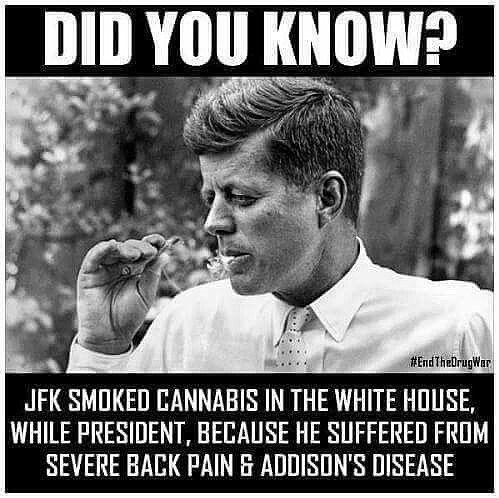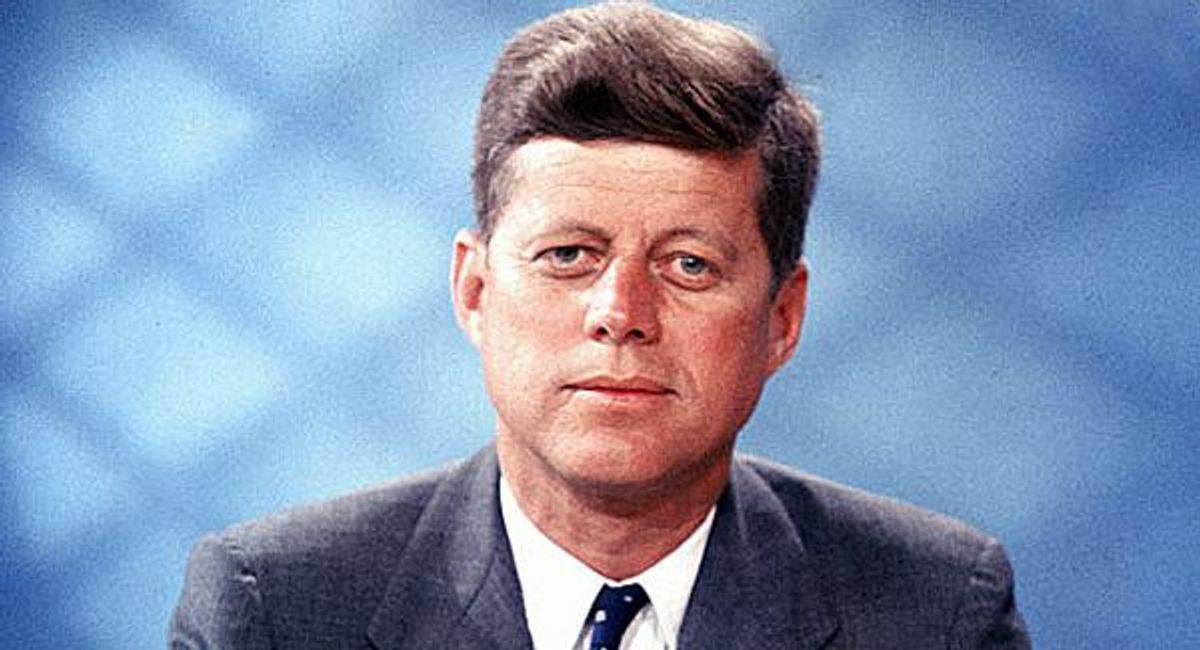A long-circulating image seen often on social media claims that President John F. Kennedy (JFK) habitually smoked cannabis in the White House during his presidency to alleviate back pain and the symptoms of Addison's Disease:

References to the rumor appeared in the New York Daily News in 1991 and the New York Times in 1984 (the latter in a letter to the editor about questionable biographical accounts of JFK's life). So prolific has the claim been that a strain of cannabis was informally named in Kennedy's honor.
The rumor appeared to originate with information about Kennedy's health uncovered by biographers long after JFK's 1963 assassination. In 2002, a number of outlets reported on newly unveiled information about Kennedy's declining health in the years prior to his assassination:
The first thorough examination of President John F. Kennedy's medical records, conducted by an independent presidential historian with a medical consultant, has found that Kennedy suffered from more ailments, was in far greater pain and was taking many more medications than the public knew at the time or biographers have since described.
As president, he was famous for having a bad back, and since his death, biographers have pieced together details of other illnesses, including persistent digestive problems and Addison's disease, a life-threatening lack of adrenal function.
But newly disclosed medical files covering the last eight years of Kennedy's life, including X-rays and prescription records, show that he took painkillers, antianxiety agents, stimulants and sleeping pills, as well as hormones to keep him alive, with extra doses in times of stress.
At times the president took as many as eight medications a day, says the historian, Robert Dallek. A committee of three longtime Kennedy family associates, who for decades refused all requests to look at the records, granted Mr. Dallek's, in part because of his "tremendous reputation," said one of them, Theodore C. Sorensen, who was the president's special counsel.
Mr. Dallek is writing a biography, "An Unfinished Life: John F. Kennedy, 1917-1963," to be published by Little, Brown. He was allowed to examine the records over two days last spring in the company of a physician, Jeffrey A. Kelman, and to make notes but not photocopies. Their findings appear in the December issue of The Atlantic, and they discussed them in interviews with The New York Times. The new information shows how far Kennedy went to conceal his ailments and shatters the image he projected as the most vigorous of men. It is a remarkable example of a phenomenon that has been seen many times, notably in the case of Franklin D. Roosevelt.
Yet for all of Kennedy's suffering, the ailments did not incapacitate him, Mr. Dallek concluded. In fact, he said, while Kennedy sometimes complained of grogginess, detailed transcripts of tape-recorded conversations during the Cuban missile crisis in 1962 and other times show the president as lucid and in firm command.
The most widely referenced account of Kennedy's supposed marijuana use was not primarily linked with his health or with medical treatment. Rather, it was an anecdotal account of JFK's supposedly being introduced to recreational pot use by one of his mistresses that was published in the National Enquirer tabloid in 1976 and referenced in the 1984 book The Kennedys: An American Drama by Peter Collier and David Horowitz. That latter work drew the following criticism in the aforementioned New York Times letter to the editor:
The allegation by Mr. Collier and Mr. Horowitz that President John F. Kennedy had an affair with Mary Meyer is not new. But their charge that Mrs. Meyer introduced him to marijuana in the White House bedroom and 'joked with him about being high when it was time to push the nuclear button,' if true, makes President Reagan's remark about bombing the Russians appear an act of diplomacy. Newsweek and New Times are cited as the sources for this quotation. Those periodicals, however, merely repeated the allegation as it originally appeared in an interview in the March 2, 1976, National Enquirer. Moreover, the man making the charge had previously been adjudged mentally ill and a court had appointed a conservator to handle his affairs.
The authors responded to that criticism by defending the provenance of their account of Kennedy's marijuana use:
One the matter of President Kennedy's relationship wth Mary Meyer ... Newsweek and New Times, cited in our footnotes, did indeed report on their relationship and their use of drugs. The primary source for this information, according to the respected historian Herbert Parmet in his book 'JFK: The Presidency of John F. Kennedy,' was one of Mrs. Meyer's confidants, a former Washington Post editor named James Truitt. Mr. Truitt actually took the subject of the drug use farther than we did in our book. He said that one one occasion after J.F.K. and Mrs. Meyer had smoked marijuana, President Kennedy remarked that its effect was different from that of cocaine, which he had apparently tried and which he offered to bring to a future tryst. According to Mr. Truitt, "They smoked three of the joints before he (J.F.K.) told her: 'No more. Suppose the Russians did something now.'"
Accounts that came to light in 2002 appeared to have merged with the brief and oft-repeated anecdote involving Meyer, which was both anecdotal and did not match the assertion Kennedy had used marijuana as a medicinal purposes in treating back pain or Addison's Disease.
We contacted the John F. Kennedy Library to inquire as to whether any firm information in their extensive archives substantiated the long-held rumor that JFK had medicated his largely secret medical problems with marijuana. An archivist noted that documentation supported the use of off-label or possibly illicit medications for his ailments, but that marijuana was not among those treatments:
I'm not seeing anything that confirms this assertion. I've never actually seen the medical records from his Personal Papers, but am relying on accounts of biographers, Dallek and O'Brien, who have both viewed the papers with physicians and wrote about their findings. While they list a number of drugs and various treatments used, the use of cannabis is not among them. As you know there is a good deal written about Max Jacobsen's unofficial treatments using amphetamines, but once again, no mention of cannabis being something President Kennedy used on the side, too.

